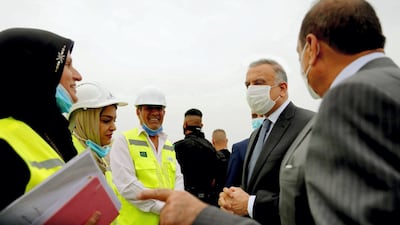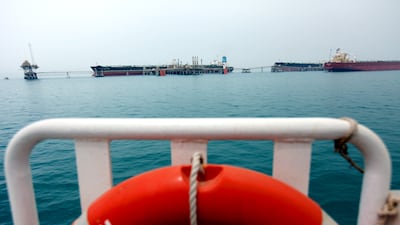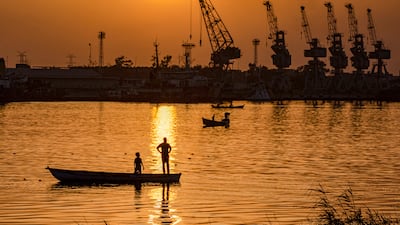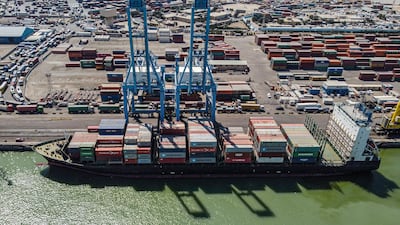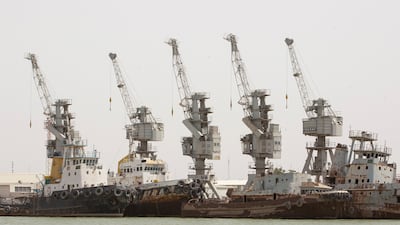A multi-billion-dollar logistics project to rival the Suez Canal has left Iraqi opinion divided.
Proponents say the $7 billion port project at Al Faw, near Basra, which will be linked an overland route to Turkey by rail, would make the port city a gateway to Europe. But critics say the plan is wildly ambitious.
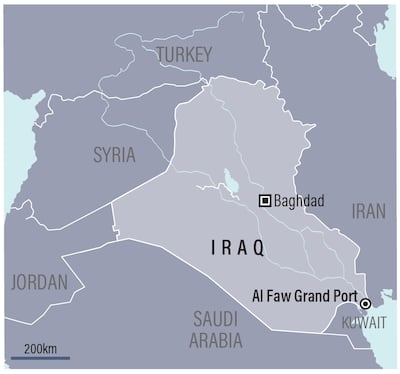
Analysts and Iraqis close to the project told The National it had been plagued by delays, corruption allegations and competition between armed militias.
It also puts a strain on the Iraqi government's limited funds as schools and hospitals grow crowded and when poor sanitation and power cuts are stirring unrest.
The cost of Iraq’s reconstruction after the 2014-18 war with ISIS was estimated by the World Bank at about $88bn.
After the conflict, oil revenue – Iraq's main source of income – plummeted, leaving the state struggling to pay public-sector salaries. This added to numerous delays. But, against these odds, in December the government signed a $2.3bn infrastructure contract with Daewoo Engineering & Construction.
The South Korean company built the port’s $1bn, 23-kilometre breakwater. The world's largest, it was an eight-year endeavour for which five million tonnes of rock were required.
Almost 12 kilometres of berths are envisaged, as is a 30km dredged channel to accommodate hefty cargo ships.
Dean Mikkelsen is a maritime and logistics analyst who has worked with oil companies in Iraq.
“I have questions on the feasibility of the rail side. It opens the door for massive bribes for purchasing land, much of it tribally owned, with money that the government does not have,” he said.
“The issues are the militias and poor infrastructure. Rail infrastructure could still become another target for terrorists in some areas.”
By Iraqi government estimates, the double-track rail link from Basra to the Turkish border could cost $13bn to build.
The project has been dogged by factionalism and arguments in parliament about how to fund it since the first contract was signed in 2013.
At the time, Iraq's transport ministry was run by Badr Organisation, a powerful political party with links to Iran.
“The main reason behind why the project has been delayed for many years is financial and administrative corruption in the ministries and parties,” said Mohammed Al Tai, a former MP for Basra.
“In the 2021 budget, a small amount has been allocated, exceeding $500 million, and this is not sufficient even for the first phase of the port, whose cost is estimated at $6 to $7 billion, if we take into consideration the rail link which is supposed to connect to the port to Turkey and Europe.”
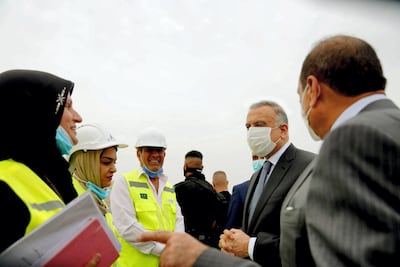
Political parties with powerful armed militias have competed for contracts for Al Faw's support operations.
“These major projects always seem to attract demands for greasing palms. The culture of corruption is so thorough that it seems to overwhelm everything,” said Kirk Sowell, publisher of the Inside Iraqi Politics newsletter.
The project cannot be faulted for lack of ambition. Once complete, if all goes according to plan, it will transport cargo to Europe overland in less time than it takes to ship it through the Suez Canal. But if the rail project stumbles, it would call into question the need for such a large port.
A UK government-commissioned study conducted in 2005, when the port was in the concept stage, said the projected cargo volume for the port was based on container handling rising from “120,000 TEU [standard shipping containers] in 2005 to 6.4 million TEU in 2055, a little less than the UK at present”.
Iraq’s economic growth would have to almost catch up with that of Britain's in the same period, an unlikely prospect, for almost all of its income is derived from oil exports.
Iraqi MP
Some argue the development is unnecessary. An article in Port Strategy last year noted that the port of Umm Qasr, only 60km from Al Faw, “has ample existing additional capacity and plenty of space for further berths and yards being constructed (and can be upgraded to handle the world’s largest vessels by dredging its channel for a fraction of the cost of Al Faw dredging)”.
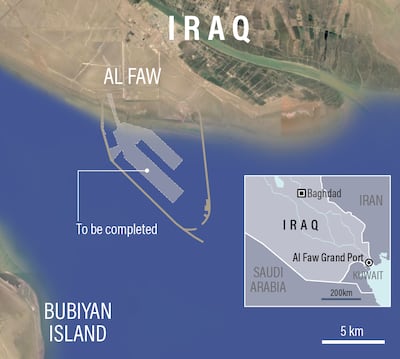
This raises the question of why Iraq is so committed to channelling funds to the new port.
As Mr Sowell notes, large projects in the country provide ample opportunity for political parties and connected security forces to make money.
Militia rivalry
At Umm Qasr, two Iraqi generals were arrested on June 12 for taking bribes to waive customs fees.
The Iran-backed Sadiqun party there is said to operate some of the infrastructure for profit, according to a 2019 report by Iraq analysts Mac Skelton and Zmkan Ali Saleem.
A report from AFP in January found corrupt practices linked to political parties were still rife at Umm Qasr.
Sadiqun is the political wing of Asaib Ahl Al Haq, an Iran-backed Shiite militia accused of murdering Iraqi activists.
At Al Faw, even security companies are reported to be linked to competing Shiite parties in Baghdad, including the Sadrist movement led by radical cleric Moqtada Al Sadr, a long-time rival of Sadiqun, which also has a powerful armed militia.
The government has tried to bring the situation under control after Iraqi media reported that militias disguised as policemen were taking bribes to let lorries enter the construction area.
“There are disputes and tensions between a company loyal to Asaib and a local security company which has loyalty to Al Sadr, that occurs from time to time. About a week ago, military checkpoints were deployed at the entrance to the port by order of the government,” an Iraqi working on the project said.
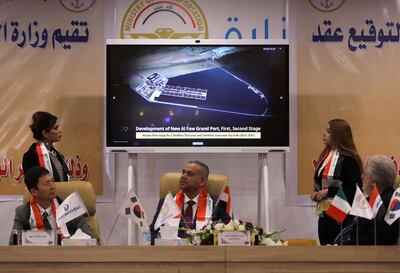
Apart from the lure of multibillion-dollar infrastructure spending, the port offers massive employment opportunities for the local population, and this has become a source of tribal and political competition.
A tribe in the area, the Beit Shaya, has staged protests to demand jobs at the port.
Its members are backed by Iraq's ports authority director Farhan Al Fartousi, who is linked to the Sadrist movement, according to two analysts and one Iraqi local working on the ports who spoke to The National.
Mr Al Fartousi led the negotiations with Daewoo to provide more jobs for the Beit Shaya, a security analyst told The National.
And while Mr Al Fartousi and Mr Al Sadr are adamant that Daewoo must finish the project, Sadiqun has been vocal in parliament for China to complete work at Al Faw.
Sadiqun and the Sadrist-linked militias have fought gun battles in the past. Both stand accused of serious violence against Iraqi civilians including protesters and political opponents since 2003.
Amid such rivalry, questions surround the death of Park Il-ho, who led Daewoo's Engineering and Construction operations at Al Faw.
Park was found dead in unexplained circumstances in August 2020 and Sadrist MPs have called for a murder inquiry. Park’s family have told South Korean media that he had no reason to take his own life.
Political optimism
Despite the problems dogging the project, prominent Iraqi politicians believe it will bring benefits once complete.
“For the people of Basra and the south this project is very important as it will create more than 100,000 job opportunities in the first stage. Then it will increase to more than 250,000 jobs for the various segments of Iraqi society,” said Mr Al Tai, the former MP from Basra.
He believes wrangling among the political blocs and parties in Baghdad is delaying the works.
“Government allocations made are modest against the real cost of the project, which includes ports, docks, airports, railways, hotels, housing complexes, hospitals, schools and recreational resorts.
“Political corruption is what is preventing this project from progressing because the money is available and the decision to complete it is in the hands of the government and parliament,” he said.
“If it is implemented, then the project will save Iraq and provide a lot of financial resources parallel to oil and gas. I believe that the current or future government will succeed in completing the project and all service projects if it moves away from the policy of axes and political gains,” he said. He was referring to Iraq's regional alliances and Iran's self-declared “Axis of Resistance".
Jaber Al Jaberi, an MP from Anbar province, in the west, was hopeful about Al Faw's impact but doubted the government's ability to see it through.
“Certainly, it is one of the most strategic projects in Iraq and the region and it will have a very large economic impact on Iraq if it is completed, but I doubt the government will be able to manage and accomplish this giant and important project,” he said.
